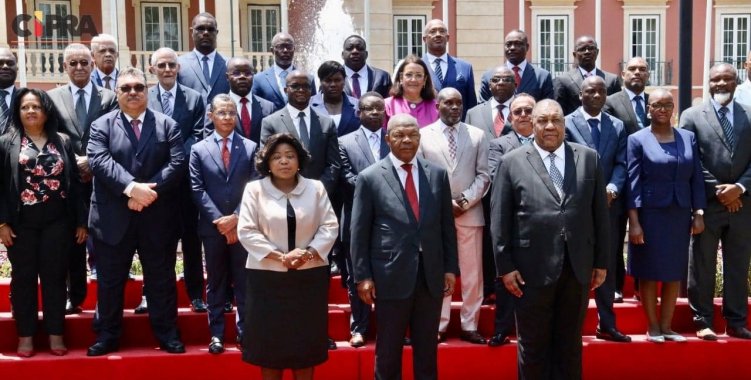Speaking this Saturday at the inauguration ceremony of the members of the Economic and Social Council, João Lourenço highlighted the importance of the private sector in the process of increasing domestic production, but recognized that the State also has responsibilities in this regard.
"We have to make a perfect marriage between the Executive and the private sector, so that each one fulfills its part, because only in this way will we be able to increase the internal production of goods and services and increase the level of the country's exports in a more diversified way ", he maintained.
The President of the Republic considered it important not to be limited only to the export of raw materials, such as oil and diamonds, but to diversify the quality of exportable products. "Angola must have the ambition to export much more, in terms of diversity, than what we have been doing", he exhorted.
João Lourenço recalled that the Executive approved important programs and promoted the increase in grain production and livestock, with the need to restock livestock and reduce the import of meat, which he considered one of the main problems in the country.
"To achieve these objectives, the Government has defined a line of financing for the next five years and I hope that the private sector will take this opportunity to invest in the growth of the bovine population and in the industrial capacity to transform the meat", he said, in a statement made available by the Executive to which VerAngola had access.
According to the Head of State, the country needs to invest in more slaughterhouses, to ensure that the meat reaches consumers' tables in good condition.
João Lourenço hopes that the country will become a major exporter of fish and other seafood products, with the recent approval of the program to encourage fish capture. "With a country with 1650 kilometers of coastline, we must necessarily be exporters of fish and other products from the sea. Although we already do it on a small scale, I believe that, depending exclusively on us, we can take a leap and become a great exporter of fish and other sea products", he encouraged.
João Lourenço asked the Economic and Social Council to find the best ways to use the timber industry for the benefit of the country, with the aim of better protecting forests and creating jobs.
The President of the Republic also highlighted the importance of processing more local wood and developing the furniture industry, which he considered currently highly dependent on imports. "The furniture industry must be developed. Today, apart from the production of school desks, little else is done. Therefore, the furniture that our homes use is largely imported. We have the possibility of producing them locally", he appealed.
On social issues, the official highlighted the importance of finding solutions to expand access to education, health, sport and culture for all regions of the country, including the construction of new infrastructures.
Advisor José Octávio Serra Van-Dúnem told the press, at the end of the ceremony, that the Economic and Social Council intends to contribute with ideas and, mainly, to present proposals that can help the President of the Republic and the Executive to implement public policies that meet the citizens' expectations.
List of individuals that make up the Economic and Social Council:
The CES has 54 members, including recognized specialists in the areas of economic and social sciences, entrepreneurs and managers with national and international experience.
The body allows the Holder of Executive Power to receive contributions from the scientific, academic, business community, cooperatives and associations that contribute to the socio-economic development of the country.
- José Octávio Serra Van-Dúnem (coordinator)
- Adérito João Saramago Areias Pereira
- Amadeu da Silva
- André Amorim
- António André Chivanga Barros
- António Carlos Cambuta
- Antonio José Mateus Gomes de Macedo
- Armando Manuel Valente
- Armando Manuel
- Belarmino Hungulo Jelembi
- Cláudio Pinheiro Pinto Macedo
- Cristina Silvestre
- Delma Gomes Monteiro
- Domingos Vieira Vunge
- Gualberto Manuel Amaro Lima Campos
- Henriqueta Maria Sebastião de Carvalho
- Hernany Martins Pena Luís
- Isaías Domingos da Cunha
- Ismael Abraão Gaspar Martins
- Jinofla Nataniela de Carvalho Viegas de Castro
- João Manuel
- Jorge Hilário
- José Carlos Manuel de Oliveira Cunha
- José Ludovino Severino de Vasconcelos
- Laurinda de Jesus Fernandes Hoygaard
- Lizete da Conceição Manuel Gonga
- Manuel Victoriano Sumbula
- Maria Helena Ramos Pereira dos Santos Miguel
- Mário Jorge Faria da Cruz
- Mário Nelson Cardoso Maximino
- Nelson Fidel Candundo Carrinho
- Nuno Borges
- Paulo Cabral Pedro Gaspar
- Pedro Carmo Manuel Pereira
- Pedro Godinho Domingos
- Precioso Domingos
- Ramiro Manuel Barreira
- Raul Mateus
- Salvador Rodrigues e Paulo Neto
- Sérgio Zeferino de Assis Calundungo
- Virgínia Maria Abrunhosa Lacerda Quartin
- Vladimir Kiluange Agrias Russo
- Wanderley Augusto Ribeiro
- Yuri de Gilson Cassumba Quixina







